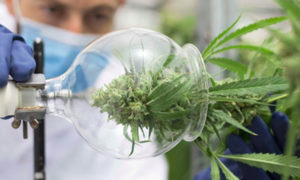 A number of studies looking at the potential for CBD and other cannabis-related compounds in treating or alleviating COVID-19 and its related symptoms continue to progress – with one Israeli study in particular hinting at promising results combining CBD with other terpene products.
A number of studies looking at the potential for CBD and other cannabis-related compounds in treating or alleviating COVID-19 and its related symptoms continue to progress – with one Israeli study in particular hinting at promising results combining CBD with other terpene products.
A group of scientists at the University of Lethbridge in Canada recently published a paper indicating that high-CBD cannabis may suppress enzyme pathways through which the novel coronavirus gains entry into the human body.
Innocan Pharma recently announced that it had raised $5.1m CAD to study CBD’s impact on the coronavirus in a study at Tel Aviv University in Israel. Separately, clinical trials testing cannabis against the coronavirus are planned at Rambam Heath Care Campus in Haifa.
Meanwhile another trial, also in Israel, has shown initial evidence of CBD and terpenes working in combination to have a greater beneficial impact against the virus.
In July, scientists with Eybna Technologies released preliminary results from tests of the company’s NT-VRL formulation, which is made up of more than terpenes. Eybna told CBD-Intel the 30 cannabis-derived terpenes were among those that have been designated “generally recognized as safe” by the US Food and Drug Administration (FDA).
Cytokine storm front
The company said the terpenes involved are all found in various plants including thyme, citrus, and black pepper as well as cannabis and have potential as anti-infammatory agents.
The formulation was tested for its benefits against “cytokine storms” – a condition arising when the body’s immune system turns against its own healthy tissue, and a known symptom of COVID-19.
“The preliminary results were highly positive, demonstrating significant anti-inflammatory activity of terpenes and breaking the perception that terpenes are just flavourings and fragrances compounds with a placebo effect,” said Nadav Eyal, Eybna’s co-founder and CEO.
Eybna used AI processes – still relatively rarely used in drug development – including biological data mining, data processing and formulation design, to develop the NT-VRL formulation as something that could effectively target a specific health condition, Eyal told CBD-Intel.
He said the company had performed an initial preclinical in-vitro assay and was making progress towards starting an official clinical trial.
The preliminary results indicate that CBD inhibited cytokine storms more effectively than NT-VRL. But the best results came from combining the two, with a reported 90% rate of inhibition of cytokine inflammation.
Possible application to other conditions
Dr Matthew Mintz, a CBD expert and author of Medical Marijuana and CBD: A Physician’s Guide for Patients, who was independent of the study, called the results “intriguing”.
The fact that a terpene formulation appeared to have similar anti-inflammatory effects to CBD was new in itself, and the possibility that it could lead to increased effects when used in conjunction with CBD is even more intriguing, he told CBD-Intel.
“If terpene products have a complementary effect with CBD, then this could lead to products beyond COVID, like treatments for arthritis and depression,” Mintz said.
Eybna’s own researchers agreed that the combined CBD-and-terpenes results were surprising. They said further study of the molecular mechanism behind the inhibition was needed to determine whether it represents a true synergistic (or entourage) effect, but the study could point towards a new avenue of research.
“This is opening a new world for synergistically-effective natural formulations – holding therapeutic capabilities that for single active pharmaceutical ingredients will be difficult to match,” Eyal said.
‘Significant anti-inflammatory effect’
Eybna conducted its experiments in conjunction with CannaSoul Analytics, which was founded by Dedi Meiri, a professor at the Israel Institute of Technology, and operates under the supervision of the Israeli Health Ministry’s Cannabis Unit.
The two organisations compared results using NT-VRL, CBD, both, and dexamethasone, a common anti-inflammatory steroid. The tests were performed on human peripheral blood mononuclear cells with a close eye on whether or not they would compromise cell viability.
“The goal of this study was to assess the effect of Eybna’s NT-VRL terpene formulation on cytokine secretion,” Meiri said. “NT-VR terpene formulation showed significant anti-inflammatory effect which contributed to a functional immunological response in-vitro.”
Mintz warned, however, that other researchers studying cytokine storms have struggled to find a reliable inhibitor.
“The problem is translating this to actual clinical research,” he said. “The pharmaceutical industry has been working for years on both chemicals and biologics to decrease the cytokine storm that is implicated in sepsis, and seems to play a role in serious COVID-19 infections. The problem is that they too have had similar studies showing that these agents work in a test-tube, but when they try it in real patients, it doesn’t seem to pan out.”
But Eybna researchers say the “cytokine storm assay” is a well established research tool that is respected by the US FDA, and while living patients present more challenges, their research indicates that dosage and individual compound bioavailability are key factors to resolving that issue. They also believe terpene inhalation is the most efficient way to get to infected lung cells and using that delivery method may address the bioavailability issue.
What This Means: While it is still at an early research stage, Eybna’s work presents intriguing possibilities for the potential of a CBD/terpene combination that could have wider applications, creating a possible future avenue of growth for the CBD market.
What’s more, the results showing CBD outperform a commercial anti-inflammatory product are more evidence that CBD’s beneficial effects can hold up to scrutiny in a laboratory setting.
– Sam Newhouse CBD-Intel contributing writer
Photo: Eybna Technologies







